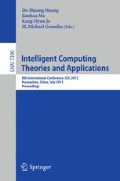Abstract
This paper proposes and experiments a new approach for morphological feature disambiguation of non-vocalized Arabic texts using a possibilistic classifier. The main idea is to learn contextual dependencies between features from vocalized texts and exploit this knowledge to disambiguate non-vocalized ones. We use possibility theory as a means to model imprecision in the training and testing steps, since the context is itself ambiguous. We also investigate the dependency between various features focusing on the Part-Of-Speech (POS).
Access this chapter
Tax calculation will be finalised at checkout
Purchases are for personal use only
Preview
Unable to display preview. Download preview PDF.
References
Buckwalter, T.: Buckwalter Arabic Morphological Analyzer Version 2.0. Linguistic Data Consortium (LDC) catalogue number LDC2004L02 (2004) ISBN 1-58563-324-0
Haouari, B., Ben Amor, N., Elouedi, Z., Mellouli, K.: Naïve Possibilistic Network Classifiers. Fuzzy Sets and Systems 160, 3224–3238 (2009)
Harrag, F., Hamdi-Cherif, A., Al-Salman, A.M.S., Elyas El-Qawasmeh, E.: Experiments in Improvement of Arabic Information Retrieval. In: 3rd International Conference on Arabic Language Processing (CITALA), Rabat, Morocco, pp. 71–81 (2009)
Bounhas, I., Elayeb, B., Evrard, F., Slimani, Y.: Toward a Computer Study of The Reliability of Arabic Stories. Journal of the American Society for Information Science and Technology 61, 1686–1705 (2010)
Al-Echikh, A.A.: Encyclopedia of The Six Major Citation Collections, Dar-esselem, Ryadh, KSA (1998)
Roth, R., Rambow, O., Habash, N., Diab, M., Rudin, C.: Arabic Morphological Tagging, Diacritization, and Lemmatization Using Lexeme Models and Feature Ranking. In: Proceedings of Association for Computational Linguistics (ACL), Columbus, Ohio, USA, pp. 573–580 (2008)
Debili, F., Achour, H., Souissi, E.: La langue arabe et l’ordinateur: de l’étiquetage grammatical à la voyellation automatique. In: IRMC (2002) (in French)
Dubois, D., Prade, H.: Possibility Theory: An Approach to Computerized Processing of Uncertainty. Plenum Press, New York (1994)
Merialdo, B.: Tagging English Text with A Probabilistic Model. Computational Linguistics 20, 155–171 (1994)
Daoud, D.: Synchronized Morphological and Syntactic Disambiguation for Arabic. Advances in Computational Linguistics 41, 73–86 (2009)
Khoja, S.: APT: Arabic Part-of-speech Tagger. In: Proc. Student Workshop at the Second Meeting of the North American Association for Computational Linguistics, Carnegie Mellon University, Pennsylvania, USA (2001)
Diab, M., Hacioglu, K., Jurafsky, D.: Automatic Tagging of Arabic Text: From Raw Text to Base Phrase Chunks. In: Proc. Human Language Technology Conference / North American Chapter of the Association for Computational Linguistics Annual Meeting (HLT-NAACL 2004), Boston, USA, pp. 149–152 (2004)
Habash, N., Rambow, O.: Arabic Diacritization Through Full Morphological Tagging. In: Proc. Human Language Technology Conference / North American Chapter of the Association for Computational Linguistics Annual Meeting (HLT-NAACL 2007), Companion Volume, Rochester, NY, USA, pp. 53–56 (2007)
Habash, N., Rambow, O., Roth, R.: MADA+TOKAN: A Toolkit for Arabic Tokenization, Diacritization, Morphological Disambiguation, POS Tagging, Stemming and Lemmatization. In: Proceedings of the 2nd International Conference on Arabic Language Resources and Tools (MEDAR), Cairo, Egypt, pp. 102–109 (2009)
Hoceini, Y., Cheragui, M.A., Abbas, M.: Towards a New Approach for Disambiguation in NLP by Multiple Criterian Decision-Aid. The Prague Bulletin of Mathematical Linguistics 95, 19–32 (2011)
Author information
Authors and Affiliations
Editor information
Editors and Affiliations
Rights and permissions
Copyright information
© 2012 Springer-Verlag Berlin Heidelberg
About this paper
Cite this paper
Ayed, R., Bounhas, I., Elayeb, B., Evrard, F., Saoud, N.B.B. (2012). Arabic Morphological Analysis and Disambiguation Using a Possibilistic Classifier. In: Huang, DS., Ma, J., Jo, KH., Gromiha, M.M. (eds) Intelligent Computing Theories and Applications. ICIC 2012. Lecture Notes in Computer Science(), vol 7390. Springer, Berlin, Heidelberg. https://doi.org/10.1007/978-3-642-31576-3_36
Download citation
DOI: https://doi.org/10.1007/978-3-642-31576-3_36
Publisher Name: Springer, Berlin, Heidelberg
Print ISBN: 978-3-642-31575-6
Online ISBN: 978-3-642-31576-3
eBook Packages: Computer ScienceComputer Science (R0)

